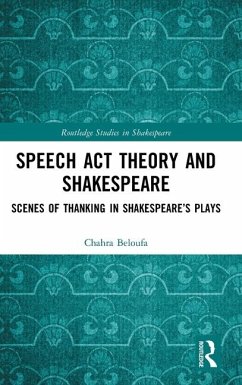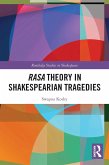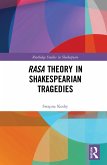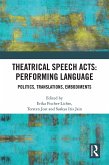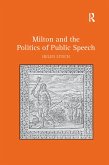- Gebundenes Buch
- Merkliste
- Auf die Merkliste
- Bewerten Bewerten
- Teilen
- Produkt teilen
- Produkterinnerung
- Produkterinnerung
Speech Act Theory and Shakespeare delves deeper than linguistic ornamentation to illuminate the complex dynamics of thanking as a significant speech act in Shakespearean plays.
Andere Kunden interessierten sich auch für
![Shakespeare and Complexity Theory Shakespeare and Complexity Theory]() Claire HansenShakespeare and Complexity Theory208,99 €
Claire HansenShakespeare and Complexity Theory208,99 €![Shakespeare and Complexity Theory Shakespeare and Complexity Theory]() Claire HansenShakespeare and Complexity Theory68,99 €
Claire HansenShakespeare and Complexity Theory68,99 €![Rasa Theory in Shakespearian Tragedies Rasa Theory in Shakespearian Tragedies]() Swapna KoshyRasa Theory in Shakespearian Tragedies59,99 €
Swapna KoshyRasa Theory in Shakespearian Tragedies59,99 €![Rasa Theory in Shakespearian Tragedies Rasa Theory in Shakespearian Tragedies]() Swapna KoshyRasa Theory in Shakespearian Tragedies187,99 €
Swapna KoshyRasa Theory in Shakespearian Tragedies187,99 €![Shakespeare's Figures of Speech Shakespeare's Figures of Speech]() Kate Emery PogueShakespeare's Figures of Speech19,99 €
Kate Emery PogueShakespeare's Figures of Speech19,99 €![Theatrical Speech Acts Theatrical Speech Acts]() Theatrical Speech Acts187,99 €
Theatrical Speech Acts187,99 €![Milton and the Politics of Public Speech Milton and the Politics of Public Speech]() Helen LynchMilton and the Politics of Public Speech61,99 €
Helen LynchMilton and the Politics of Public Speech61,99 €-
-
-
Speech Act Theory and Shakespeare delves deeper than linguistic ornamentation to illuminate the complex dynamics of thanking as a significant speech act in Shakespearean plays.
Hinweis: Dieser Artikel kann nur an eine deutsche Lieferadresse ausgeliefert werden.
Hinweis: Dieser Artikel kann nur an eine deutsche Lieferadresse ausgeliefert werden.
Produktdetails
- Produktdetails
- Verlag: Routledge
- Seitenzahl: 226
- Erscheinungstermin: 28. Mai 2024
- Englisch
- Abmessung: 235mm x 157mm x 17mm
- Gewicht: 485g
- ISBN-13: 9781032727141
- ISBN-10: 1032727144
- Artikelnr.: 70149941
- Herstellerkennzeichnung
- Libri GmbH
- Europaallee 1
- 36244 Bad Hersfeld
- gpsr@libri.de
- Verlag: Routledge
- Seitenzahl: 226
- Erscheinungstermin: 28. Mai 2024
- Englisch
- Abmessung: 235mm x 157mm x 17mm
- Gewicht: 485g
- ISBN-13: 9781032727141
- ISBN-10: 1032727144
- Artikelnr.: 70149941
- Herstellerkennzeichnung
- Libri GmbH
- Europaallee 1
- 36244 Bad Hersfeld
- gpsr@libri.de
Chahra Beloufa is Assistant Professor of English language and literature at the Arab Open University, Saudi Arabia. She has a PhD from the University of Paul Valery. She was a researcher at The Institute of Research on the Renaissance, the Classical Age, and the Enlightenment (IRCL) working under the supervision of Prof Nathalie Vienne Guerrin.
General Introduction
Part I: Thanking in the Elizabethan World
1.1. The Early Modern Lexicon of "Thanking"
1.2.1. Eucharist and Thanksgiving
1.2.2. Performing Grace versus Saying "Thanks"
1.3. Thanking in Early Modern England: From a Learned Habit to an
Institutionalised Social Norm?
1.3.1. Festive Thanking
1.4. Prayer: Spiritual Economy of Thanking
1.5. Benedicam Dominum: Singing Benefits
1.6. Thankfulness and Beneficence: A Treatise of Christian Beneficence
1.7. Charitable Giving and the Thanksgiving of the Poor in Early Modern
England
1.8. Urban Patronage in England and the Importance of Giving
1.9. Gift and Graceful Language
1.10. A Gentleman's "Thanks": Images of Courtesy
1.11. Women's Thanks: "The Churching of Women" or the "Thanksgiving of
Women after Childbirth"
1.12. Gratitude and Erasmus: On Giving Thanks and Liberality
1.13. Kindness and Gratitude
Conclusion
Part II: The Art of Thanking in Shakespeare: Scene Focus
2.1. Thanking as a Verbal and Non-Verbal Activity in Theatre
2.2. Thanks as a Politeness Sensitive Speech Event
2.3. Theories of Politeness
2.4. Politeness in Dramatic Dialogue
2.5. Thanking in Pragmatics
2.6. Thanking and Not Thanking in Shakespeare
2.7. Diplomatic Thankings in Shakespeare: A Political Super Strategy to
Characters' Empowerment
2.8. "The poorest service is repaid with thanks" The Importance of Giving
when Thanking is Not Enough, the case of The Merchant of Venice
2.9. "Do so, and After Two Days I Will Discharge Thee" (Tem. 1.2.):
Characters Waiting for Restitution and Recompense
2.10. Excessive Giving of Thanks and Gifts: The Way to Misanthropy in
Timon of Athens
2.11. "We Met Here Both to Thank and to Remember" (Cor.2.2): The Role of
Memory in Giving Thanks in Shakespeare's Plays
2.12. Ceremonial Thanksgiving on the Stage: Prayer and Sacrifice in
Pericles and Cymbeline
Conclusion
General Conclusion
Part I: Thanking in the Elizabethan World
1.1. The Early Modern Lexicon of "Thanking"
1.2.1. Eucharist and Thanksgiving
1.2.2. Performing Grace versus Saying "Thanks"
1.3. Thanking in Early Modern England: From a Learned Habit to an
Institutionalised Social Norm?
1.3.1. Festive Thanking
1.4. Prayer: Spiritual Economy of Thanking
1.5. Benedicam Dominum: Singing Benefits
1.6. Thankfulness and Beneficence: A Treatise of Christian Beneficence
1.7. Charitable Giving and the Thanksgiving of the Poor in Early Modern
England
1.8. Urban Patronage in England and the Importance of Giving
1.9. Gift and Graceful Language
1.10. A Gentleman's "Thanks": Images of Courtesy
1.11. Women's Thanks: "The Churching of Women" or the "Thanksgiving of
Women after Childbirth"
1.12. Gratitude and Erasmus: On Giving Thanks and Liberality
1.13. Kindness and Gratitude
Conclusion
Part II: The Art of Thanking in Shakespeare: Scene Focus
2.1. Thanking as a Verbal and Non-Verbal Activity in Theatre
2.2. Thanks as a Politeness Sensitive Speech Event
2.3. Theories of Politeness
2.4. Politeness in Dramatic Dialogue
2.5. Thanking in Pragmatics
2.6. Thanking and Not Thanking in Shakespeare
2.7. Diplomatic Thankings in Shakespeare: A Political Super Strategy to
Characters' Empowerment
2.8. "The poorest service is repaid with thanks" The Importance of Giving
when Thanking is Not Enough, the case of The Merchant of Venice
2.9. "Do so, and After Two Days I Will Discharge Thee" (Tem. 1.2.):
Characters Waiting for Restitution and Recompense
2.10. Excessive Giving of Thanks and Gifts: The Way to Misanthropy in
Timon of Athens
2.11. "We Met Here Both to Thank and to Remember" (Cor.2.2): The Role of
Memory in Giving Thanks in Shakespeare's Plays
2.12. Ceremonial Thanksgiving on the Stage: Prayer and Sacrifice in
Pericles and Cymbeline
Conclusion
General Conclusion
General Introduction
Part I: Thanking in the Elizabethan World
1.1. The Early Modern Lexicon of "Thanking"
1.2.1. Eucharist and Thanksgiving
1.2.2. Performing Grace versus Saying "Thanks"
1.3. Thanking in Early Modern England: From a Learned Habit to an
Institutionalised Social Norm?
1.3.1. Festive Thanking
1.4. Prayer: Spiritual Economy of Thanking
1.5. Benedicam Dominum: Singing Benefits
1.6. Thankfulness and Beneficence: A Treatise of Christian Beneficence
1.7. Charitable Giving and the Thanksgiving of the Poor in Early Modern
England
1.8. Urban Patronage in England and the Importance of Giving
1.9. Gift and Graceful Language
1.10. A Gentleman's "Thanks": Images of Courtesy
1.11. Women's Thanks: "The Churching of Women" or the "Thanksgiving of
Women after Childbirth"
1.12. Gratitude and Erasmus: On Giving Thanks and Liberality
1.13. Kindness and Gratitude
Conclusion
Part II: The Art of Thanking in Shakespeare: Scene Focus
2.1. Thanking as a Verbal and Non-Verbal Activity in Theatre
2.2. Thanks as a Politeness Sensitive Speech Event
2.3. Theories of Politeness
2.4. Politeness in Dramatic Dialogue
2.5. Thanking in Pragmatics
2.6. Thanking and Not Thanking in Shakespeare
2.7. Diplomatic Thankings in Shakespeare: A Political Super Strategy to
Characters' Empowerment
2.8. "The poorest service is repaid with thanks" The Importance of Giving
when Thanking is Not Enough, the case of The Merchant of Venice
2.9. "Do so, and After Two Days I Will Discharge Thee" (Tem. 1.2.):
Characters Waiting for Restitution and Recompense
2.10. Excessive Giving of Thanks and Gifts: The Way to Misanthropy in
Timon of Athens
2.11. "We Met Here Both to Thank and to Remember" (Cor.2.2): The Role of
Memory in Giving Thanks in Shakespeare's Plays
2.12. Ceremonial Thanksgiving on the Stage: Prayer and Sacrifice in
Pericles and Cymbeline
Conclusion
General Conclusion
Part I: Thanking in the Elizabethan World
1.1. The Early Modern Lexicon of "Thanking"
1.2.1. Eucharist and Thanksgiving
1.2.2. Performing Grace versus Saying "Thanks"
1.3. Thanking in Early Modern England: From a Learned Habit to an
Institutionalised Social Norm?
1.3.1. Festive Thanking
1.4. Prayer: Spiritual Economy of Thanking
1.5. Benedicam Dominum: Singing Benefits
1.6. Thankfulness and Beneficence: A Treatise of Christian Beneficence
1.7. Charitable Giving and the Thanksgiving of the Poor in Early Modern
England
1.8. Urban Patronage in England and the Importance of Giving
1.9. Gift and Graceful Language
1.10. A Gentleman's "Thanks": Images of Courtesy
1.11. Women's Thanks: "The Churching of Women" or the "Thanksgiving of
Women after Childbirth"
1.12. Gratitude and Erasmus: On Giving Thanks and Liberality
1.13. Kindness and Gratitude
Conclusion
Part II: The Art of Thanking in Shakespeare: Scene Focus
2.1. Thanking as a Verbal and Non-Verbal Activity in Theatre
2.2. Thanks as a Politeness Sensitive Speech Event
2.3. Theories of Politeness
2.4. Politeness in Dramatic Dialogue
2.5. Thanking in Pragmatics
2.6. Thanking and Not Thanking in Shakespeare
2.7. Diplomatic Thankings in Shakespeare: A Political Super Strategy to
Characters' Empowerment
2.8. "The poorest service is repaid with thanks" The Importance of Giving
when Thanking is Not Enough, the case of The Merchant of Venice
2.9. "Do so, and After Two Days I Will Discharge Thee" (Tem. 1.2.):
Characters Waiting for Restitution and Recompense
2.10. Excessive Giving of Thanks and Gifts: The Way to Misanthropy in
Timon of Athens
2.11. "We Met Here Both to Thank and to Remember" (Cor.2.2): The Role of
Memory in Giving Thanks in Shakespeare's Plays
2.12. Ceremonial Thanksgiving on the Stage: Prayer and Sacrifice in
Pericles and Cymbeline
Conclusion
General Conclusion

